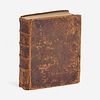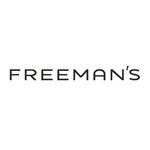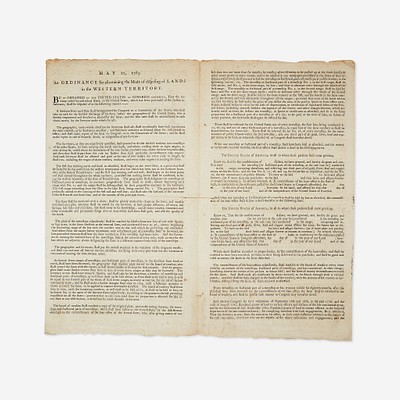[Americana] [First Catholic Bible] The Holy Bible, Translated from the Latin Vulgate: Diligently Compared with the Hebrew, Greek, and Other Editions,
About Seller
2400 Market St
Philadelphia, PA 19147
United States
Established in 1805, Freeman’s Auction House holds tradition close, with a progressive mind-set towards marketing and promotion, along with access to a team of top experts in the auction business. And now with offices in New England, the Southeast, and on the West Coast, it has never been easier to ...Read more
Two ways to bid:
- Leave a max absentee bid and the platform will bid on your behalf up to your maximum bid during the live auction.
- Bid live during the auction and your bids will be submitted real-time to the auctioneer.
Bid Increments
| Price | Bid Increment |
|---|---|
| $0 | $25 |
| $500 | $50 |
| $1,000 | $100 |
| $2,000 | $200 |
| $3,000 | $250 |
| $5,000 | $500 |
| $10,000 | $1,000 |
| $20,000 | $2,000 |
| $30,000 | $2,500 |
| $50,000 | $5,000 |
| $100,000 | $10,000 |
About Auction
Feb 17, 2022
Freeman’s February 17 Books and Manuscripts auction is an Americana collector’s delight, with highlights led by an extremely rare Northwest Territory Land Ordinance from 1785. Curated by Darren WInston, Head of the Books and Manuscripts Department at Freeman's. Freeman's info@freemansauction.com
- Lot Description
[Americana] [First Catholic Bible] The Holy Bible, Translated from the Latin Vulgate: Diligently Compared with the Hebrew, Greek, and Other Editions, in Divers Languages; and First Published by the English College at Doway, Anno 1609
The First Catholic Bible Printed in the United States
Philadelphia: Carey, Stewart, and Co., 1790. Two volumes in one. First American edition. 4to, 10 1/8 x 8 in. (257 x 203 mm). viii, 487, (5); 280, *[281-284]*, 281-490 pp. Printed in two columns; without separate title-page for second part, as issued. Contemporary brown calf, stamped in blind, boards, joints and extremities rubbed and worn, rear board starting; all edges trimmed; extensive ownership signatures belonging to the Cauffman family of Philadelphia and Roxborough, on front paste-down, front free endpaper, title-page, and at head of the first page of The Book of Genesis, dating from 1796-1985; foxing and soiling to most text leaves; pencil sketches on interior blanks; repair in bottom corner, pp. 91/92 in first part; tear in upper gutter, pp. 473/474 in first part; tear in bottom gutter, pp. 303/304 in second part; MS. on verso of rear blank; lacking rear endpaper; scattered marginalia; book-plate of Theo. F. Cauffman, Warden of St. Timothy's Church, Roxborough, ca. 1860s, on front paste-down. Evans 22349; Sabin 5166; Hills 23; Herbert 1343; ESTC W38299
Rare first American edition of the Douay version of the Bible, the first Catholic Bible printed in the United States, which was based on the second edition Catholic Bible by English Bishop Richard Challoner of 1763-64. "In 1789, Mr. Carey announced plans to publish a translation of the Vulgate Bible if he could secure 400 subscribers. The actual number secured was 471. The total number of the edition printed is not known; however, it could not have been much over the number of subscriptions as the demand for a Catholic Bible was small in the United States at that time. The undertaking was therefore an expensive one for the size of the edition, and it was first decided to print the Bible in 48 parts, to be issued weekly. Though it is generally assumed that a few parts were printed (the designation 'Vol I' does not appear on any signatures on the first 89 pages of text), Carey abandoned the scheme and formed the publishing firm of Carey, Stewart & Co., which published the Bible on Dec 1, 1790. The type was specially cast by Baine and Co., Philadelphia. It is now the rarest of the notable early American editions of the Bible." (Hills, The English Bible in America)
This rare Catholic Bible features a fascinating near-200 year manuscript record of the Cauffman family of Philadelphia and Roxborough. It contains 10 ownership signatures of the various family members, starting with the original owner, Joseph Cauffman, in 1796, and ends with Tyler Hart Bradbury, 1985. According to the Records of the American Catholic Historical Society of Philadelphia, Cauffman was the founder of the Cauffman family line in the United States. Born in Strasburg, Germany in 1720, he moved to Philadelphia in 1749. He is known to have contributed funds to the construction of St. Mary's church in Philadelphia, and was later a trustee. He also raised money to found a Catholic Academy in Georgetown, Washington, D.C., and invested heavily in land in Philadelphia, Chester, Bucks, Westmoreland, Indiana, and Montgomery counties in Pennsylvania. He married Anna Catherine around 1754, died in Philadelphia in 1807, and was interred in St. Mary's.
Rare. We can locate only six other copies of this bible in the auction record since 1898.
- Shipping Info
-
No lot may be removed from Freeman’s premises until the buyer has paid in full the purchase price therefor including Buyer’s Premium or has satisfied such terms that Freeman’s, in its sole discretion, shall require. Subject to the foregoing, all Property shall be paid for and removed by the buyer at his/ her expense within ten (10) days of sale and, if not so removed, may be sold by Freeman’s, or sent by Freeman’s to a third-party storage facility, at the sole risk and charge of the buyer(s), and Freeman’s may prohibit the buyer from participating, directly or indirectly, as a bidder or buyer in any future sale or sales. In addition to other remedies available to Freeman’s by law, Freeman’s reserves the right to impose a late charge of 1.5% per month of the total purchase price on any balance remaining ten (10) days after the day of sale. If Property is not removed by the buyer within ten (10) days, a handling charge of 2% of the total purchase price per month from the tenth day after the sale until removal by the buyer shall be payable to Freeman’s by the buyer. Freeman’s will not be responsible for any loss, damage, theft, or otherwise responsible for any goods left in Freeman’s possession after ten (10) days. If the foregoing conditions or any applicable provisions of law are not complied with, in addition to other remedies available to Freeman’s and the Consignor (including without limitation the right to hold the buyer(s) liable for the bid price) Freeman’s, at its option, may either cancel the sale, retaining as liquidated damages all payments made by the buyer(s), or resell the property. In such event, the buyer(s) shall remain liable for any deficiency in the original purchase price and will also be responsible for all costs, including warehousing, the expense of the ultimate sale, and Freeman’s commission at its regular rates together with all related and incidental charges, including legal fees. Payment is a precondition to removal. Payment shall be by cash, certified check or similar bank draft, or any other method approved by Freeman’s. Checks will not be deemed to constitute payment until cleared. Any exceptions must be made upon Freeman’s written approval of credit prior to sale. In addition, a defaulting buyer will be deemed to have granted and assigned to Freeman’s, a continuing security interest of first priority in any property or money of, or owing to such buyer in Freeman’ possession, and Freeman’s may retain and apply such property or money as collateral security for the obligations due to Freeman’s. Freeman’s shall have all of the rights accorded a secured party under the Pennsylvania Uniform Commercial Code.
-
- Buyer's Premium



 EUR
EUR CAD
CAD AUD
AUD GBP
GBP MXN
MXN HKD
HKD CNY
CNY MYR
MYR SEK
SEK SGD
SGD CHF
CHF THB
THB![[Americana] [First Catholic Bible] The Holy Bible, Translated from the Latin Vulgate: Diligently Compared with the Hebrew, Greek, and Other Editions,](https://s1.img.bidsquare.com/item/l/1094/10945480.jpeg?t=1NcmVq)
![[Americana] [First Catholic Bible] The Holy Bible, Translated from the Latin Vulgate: Diligently Compared with the Hebrew, Greek, and Other Editions,](https://s1.img.bidsquare.com/item/s/1094/10945480.jpeg?t=1NcmVq)











